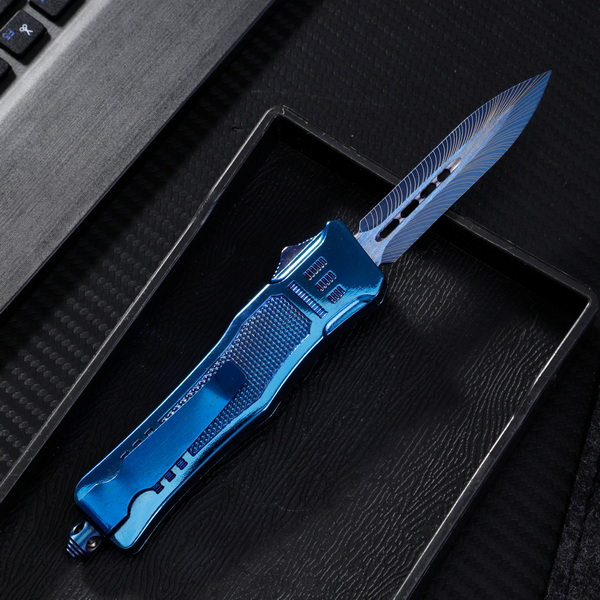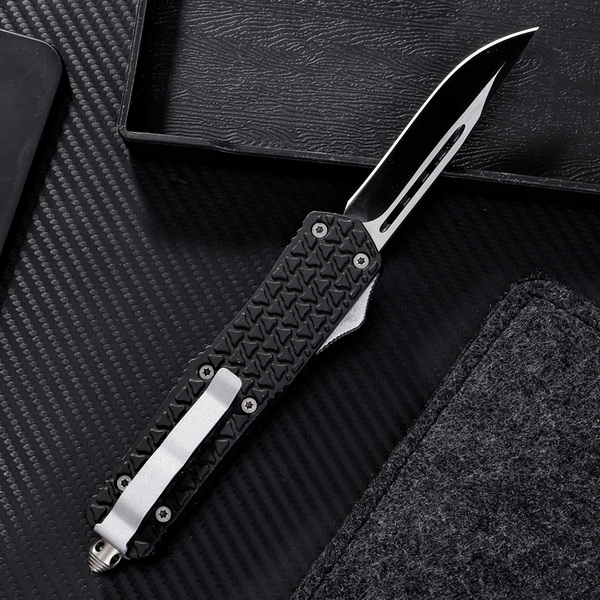Views: 222 Author: Loretta Publish Time: 2025-10-05 Origin: Site











Content Menu
● Introduction to OTF Knives and Fixed Blades
>> Ideal Situations for OTF Knives
>> Considerations for OTF Knives
● Overview of Fixed Blade Knives
>> What is a Fixed Blade Knife?
>> Key Features of Fixed Blade Knives
>> Ideal Situations for Fixed Blades
>> Considerations for Fixed Blades
● Detailed Comparison: OTF Knife vs Fixed Blade
>> Deployment and Accessibility
>> Portability and Concealment
● How to Choose Between OTF Knife and Fixed Blade
>> Lifestyle: Urban and Everyday Use
>> Lifestyle: Outdoor and Survival Use
>> Tactical and Professional Use
● Safety and Legal Considerations
● FAQ
>> 1. What types of tasks are OTF knives best suited for?
>> 2. Are there any legal restrictions on owning or carrying OTF knives?
>> 3. How durable is an OTF knife compared to a fixed blade?
>> 4. Can an OTF knife be repaired if the mechanism breaks?
>> 5. Which knife requires less maintenance?
When it comes to choosing an outdoor knife, the decision between an OTF knife and a fixed blade knife is crucial. Each type offers unique advantages and suits different styles of use, whether for everyday carry, camping, hunting, or tactical purposes. This comprehensive guide will help you understand the key differences, benefits, and ideal use cases to determine which knife fits your lifestyle better.

Outdoor enthusiasts and professionals often debate about the best knife design for various applications. The OTF knife and fixed blade knife are among the most popular types, yet they serve very different purposes. Understanding their design and intended use is the first step in selecting the right tool.
OTF, or Out-the-Front knives, are a specialized kind of automatic folding knives with blades that deploy straight out from the handle through a sliding mechanism. This design offers quick one-handed access and is favored for tactical and everyday carry use.
Fixed blade knives have blades permanently attached to handles with no moving parts. Known for their durability and strength, fixed blades excel in outdoor survival, heavy cutting tasks, and situations that demand reliability.
An OTF knife features a blade that slides out of the front of the handle, typically powered by a spring mechanism. There are two main types:
- Double-action OTF knives: The blade extends and retracts with the same sliding switch, providing ease of use.
- Single-action OTF knives: The blade extends with a switch but must be retracted manually, typically by pressing on the blade or a separate mechanism.
This mechanism allows rapid deployment, which is why OTF knives are often known as tactical or switchblade knives in certain circles.
- Quick Deployment: OTF knives can be deployed or retracted almost instantly, making them ideal for scenarios where speed is essential, such as self-defense or emergency use.
- Compact and Concealable: Because the blade folds into the handle, OTF knives tend to be compact and easier to carry discreetly in pockets or bags.
- Safety Mechanisms: Most quality OTF knives come with locks and safety features to prevent accidental deployment, increasing their reliability.
- Modern and Unique Aesthetic: The sleek, futuristic design of OTF knives appeals to knife collectors and enthusiasts who appreciate mechanical engineering.
- Emergency responders who need fast access to a blade.
- Everyday carry users requiring a versatile, quick-to-open knife.
- Tactical operators or security personnel with one-handed operation needs.
- The moving parts require regular maintenance and lubrication to ensure smooth functioning.
- Mechanical failures can occur if the knife is overused or improperly handled.
- Legal restrictions exist in many countries or states concerning the possession and use of automatic knives, so research local laws is mandatory before purchase or carry.

A fixed blade knife consists of a single, solid blade attached to the handle, with no folding or moving parts. This knife type typically comes with a sheath for safe carrying and storage. Whether the blade is short or long, straight or curved, fixed blades are designed for durability and reliability.
- Unmatched Strength: Without hinges or folding components, fixed blades can withstand heavy stress and prying, making them suitable for demanding tasks like chopping wood, batoning, and skinning game.
- Simple Maintenance: Cleaning a fixed blade is straightforward since there are no mechanical parts. This makes it easier to keep blade edges sharp and avoid dirt or rust buildup.
- Variety in Shapes and Sizes: Fixed blades come in every size, from compact hunting knives to large survival machetes, offering many options tailored to specific activities.
- Reliable in Any Conditions: Fixed blades rarely malfunction, which is critical during survival situations or extended outdoor adventures.
- Camping and hiking trips that require food preparation, firecraft, or shelter building.
- Hunting expeditions needing skinning or gutting knives.
- Survivalists and bushcraft enthusiasts needing a durable cutting tool.
- Military, rescue, and tactical professionals handling heavy-use tools.
- Less convenient for everyday carry due to size and the need for a sheath.
- Heavier and bulkier compared to folding knives.
- Immediate accessibility requires using the sheath correctly and safely.
While the table below summarizes their differences, let's delve deeper into how these characteristics translate into practical use:
The OTF knife excels in rapid deployment with a flick or slide of the thumb, enabling users to open the blade quickly in emergencies or tactical scenarios. This ease of one-handed deployment also makes it ideal for EDC (Everyday Carry) users needing instant blade access without compromising grip or hand safety.
Fixed blades require manual drawing from a sheath, which often takes longer and needs two hands, but once exposed, the knife is ready for any forceful or heavy duty task.
Fixed blades, because of their solid construction, are inherently stronger and more durable than OTF knives. The lack of a folding mechanism means no weak points, so fixed blades are professional-grade tools designed for the most demanding uses including prying, chopping, and survival tasks.
OTF knives are durable but have delicate mechanical components that can wear out, break, or become jammed, especially under heavy use or neglect.
OTF knives fold into compact handles, making them lightweight and easy to conceal in pockets, backpacks, or gear pouches. This portability is a key advantage for urban users and those who prefer lightweight gear.
Fixed blades, with their larger size and sheath, are less convenient for casual carry though preferred for outdoor adventures where immediate blade strength outweighs portability.
OTF knives need periodic cleaning and lubrication of their springs, locks, and slides, or else they risk malfunctioning. Users must be attentive to these maintenance steps to maximize lifespan and reliability.
Fixed blades require straightforward cleaning and edge sharpening but do not have mechanisms that can fail, resulting in simpler, hassle-free maintenance.
Your choice depends primarily on what you intend to use the knife for and your lifestyle demands.
If your knife will often be carried daily in a city setting for routine tasks — opening boxes, cutting strings, or quick self-defense — the OTF knife provides convenience, speed, and ease of carry. Its compact size and quick deployment make it an excellent all-around urban tool.
If you spend significant time outdoors camping, hiking, hunting, or preparing for emergencies in wilderness settings, the fixed blade knife's durability, robustness, and reliability are essential. Its ability to perform hard physical work and operate under demanding conditions makes it your best companion.
Tactical professionals may choose either or both depending on task requirements. The quick-access OTF knife pairs well with a fixed blade on hand for more intensive tasks. Law enforcement and military units often opt for easy-to-deploy knives for quick reactions.
It's important to understand that laws regulating knives vary widely. OTF knives are often classified legally as automatic knives or switchblades, which are restricted or prohibited in many areas due to their rapid deployment mechanism. Fixed blades typically face fewer legal restrictions but may require responsible carry methods, such as sheaths and permits.
Always check your local regulations before purchasing or carrying any knife, OTF or fixed blade, and practice safe handling to prevent accidents.
- Clean the blade and handle regularly, removing any dirt or debris from the sliding mechanism.
- Use appropriate lubrication for the moving parts to ensure smooth deployment.
- Periodically check safety locks and springs for wear.
- Store in a dry place to prevent rust or corrosion.
- Keep the blade sharp using whetstones, sharpening rods, or professional services.
- Clean off dirt and moisture immediately after use.
- Apply oil or rust inhibitor to the blade as needed.
- Inspect the handle for damage and repair or replace as necessary.
Both the OTF knife and fixed blade knives have distinct advantages based on their form, function, and intended use. OTF knives excel in fast, one-handed deployment, making them perfect for tactical scenarios, everyday carry, or self-defense. Fixed blades, however, stand out for their exceptional strength and reliability in heavy-duty outdoor applications, survival, and hunting.
Understanding your personal needs and lifestyle will guide you to the best choice. If portability and quick access matter most, opt for an OTF knife. For rugged, versatile, and dependable cutting tools, fixed blades are unmatched.

OTF knives are ideal for quick, everyday cutting tasks, self-defense, and tactical use where fast one-hand blade access is critical.
Yes. Many regions regulate or prohibit automatic knives like OTF knives. Always check local, state, or national laws regarding ownership and carry.
While OTF knives are reliable for many uses, fixed blades offer superior durability due to having no moving parts and a solid blade construction.
Repairs can be done but often require specialized knowledge or sending the knife to a manufacturer or skilled technician.
Fixed blade knives typically require less maintenance and are easier to clean compared to OTF knives, which need regular lubrication and mechanism care.
How to Verify Authenticity and Quality in Automatic OTF Knife Purchases
Choosing an Automatic OTF Knife for Tactical vs Everyday Use
The Benefits of Same-Day Shipping When Ordering Automatic OTF Knives
What Sets Premium Automatic OTF Knives Apart From Budget Alternatives
How to Maintain Peak Performance of Your Automatic OTF Knife
What Consumers Should Know About Automatic OTF Knife Blade Deployment
Customization Options in Automatic OTF Knives: OEM and ODM Explained